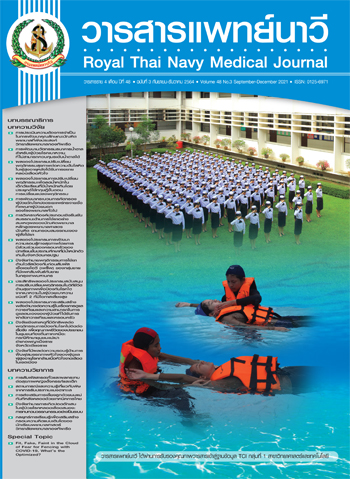Effectiveness of The Support Program for Health Behavior and Lifestyle Modification to Prevent Diabetic Kidney Disease in High Risk Patients with Type 2 Diabetes
Main Article Content
Abstract
This quasi-experimental research aimed to study the effectiveness of the support program for healthy lifestyle and behavior modification to prevent diabetic kidney disease in high risk patients with type 2 diabetes. Purposive sampling was used and followed by inclusion criteria. The sample consisted of 60 patients, divided into 30 for control group and 30 for experimental group. The experimental tool was the support program for healthy lifestyle behavior modification to prevent diabetic kidney disease. The data collection tools consisted of 1) personal data questionnaire, 2) health status and health outcome data record form, and 3) health lifestyle behaviors to prevent diabetic kidney disease questionnaire. The data were analyzed using frequency, percentage, mean, standard deviation statistics, Multivariate Analysis of Variance: one-way and Multivariate Analysis of Covariance: one-way.
The research results showed that: 1) After the intervention, the experimental group had higher mean score in healthy lifestyle behaviors than before the intervention with no statistical significance (p > .05), and lower mean score of hemoglobin A1C, systolic and diastolic blood pressure than before the intervention with statistical significance (p < .05); 2) When comparing between groups, the experimental group had higher mean score in healthy lifestyle behaviors than the control group with no statistical significance (p > .05). The experimental group had lower mean score of hemoglobin A1C and systolic blood pressure than the control group with statistical significance (p < .05), but had lower mean score of diastolic blood pressure with no statistical significance (p > .05).
The results indicated that the program was efficient and effective in producing good clinical outcomes for blood sugar and blood pressure control in high-risk patients with type 2 diabetes.
Article Details

This work is licensed under a Creative Commons Attribution-NonCommercial-NoDerivatives 4.0 International License.
References
International Diabetes Federation. Diabetes facts & figures. The IDF diabetes atlas 9th edition 2019. [Internet]. [cited 2020 February 12]. Available from: https://www. diabetesatlas.org/en/sections/worldwide-toll-of-diabetes.html.
Pitayarangsarit S, Garg R, Khunsri S, Thepsit S, Phunmung N, Apinya T. Situation on NCDs prevention and control in Thailand. Bangkok: The War Veterans Organization of Printing Mill, War Veterans Organization of Thailand Under Royal Patronage of His Majesty the King; 2018. (in Thai).
Boonsuya Ch, Aimyong N, Boonsuya P. Population health status survey in Bangkok metropolitan areas: annual report 2014. Bangkok: Faculty of Public Health, Mahidol University; 2015. (in Thai).
Bureau of Epidemiology, Department of Disease Control, Ministry of Public Health. Annual epidemiological surveillance report 2016. [Internet]. [cited 2020 February 12]. Available from: https://apps.boe.moph. go.th/boeeng/annual/AESR2016/index.html. (in Thai).
World Health Organization. Global report on diabetes. [Internet]. [cited 2020 February 12]. Available from: https://www.who.int/news-room/fact-sheets/detail/diabetes.
Diabetes Association of Thailand The Patronage of Her Royal Highness Princess Maha Chakri Sirindhorn. Clinical practice guideline for diabetes 2017. 3rd ed. Bangkok: Romyen Media; 2017. (in Thai).
Thungtong S. Delayed progression diabetic nephropathy in patients with uncontrolled Type 2 Diabetes Mellitus. Journal of The Royal Thai Army Nurses 2017;18 (Supplement May-August):17-24. (in Thai).
American Diabetes Association. Lifestyle management. Diabetes Care 2017;40(1):33-43. [Internet]. [cited 2020 March 10]. Available from: https://doi.org/10.2337/dc17-s007.
Saranburut K, Vathesatogkit P, Thongmung N, Chittamma A, Vanavanan S, Tangstheanphan T. Risk scores to predict decreased glomerular filtration rate at 10 years in an Asian general population. BMC Nephrol 2017;18(1):1-12.
Sritara P. Public release: Thai kidney risk scoring' web app on July 21, 2016. Mahidol University Faculty of Medicine Ramathibodi Hospital. [Internet]. [cited 2019 September 14]. Available from: https://med.mahidol.ac.th/cardio_vascular_risk/en/news/event/07222016-1515. (in Thai).
Rosenstock IM. Model of individual health behavior. In: Glanz K, Lewis FM, Rimer BK, editors. Health behavior and health education: theory, research and practice. San Francisco: Jossey-Bass Publishers; 1990. p. 33-62.
Damnok K, Daenseekaew S. Self-management in diabetic nephropathy prevention among people with diabetes. Journal of Nursing and Health Care 2017;35(1):91-9. (in Thai).
Prochaska JO, Velicer WF. The transtheoretical model of health behavior change. American Journal of Health Promotion 1997;12(1):38-48.
Glasgow RE, Emont S, Miller DC. Assessing delivery of the five’s a for patient-centered counseling. Health Promotion International 2006;21(3):245-55.
Stretcher VJ, Rosenstock IM. The health belief model. In: Glanz K, Lewis FM, Rimer BK, editors. Health behavior and health education: theory, research, and practice. 2nd ed. San Francisco: Jossey-Bass; 1997.
Saint Onge JM, Krueger PM. Health lifestyle behaviors among U.S. adult. SSM Popul Health 2017 Dec;3:89-98. doi: 10.1016/j.ssmph.2016.12.009.
Cohen J. Statistical power analysis for the behavioral sciences. 2nd ed. Hillsdale, NJ: Lawrence Erlbaum Associates; 1988.
Thungtong S, Chinnawong T, Thaniwattananon P. Effects of self-management support program for delayed progression of diabetic nephropathy on self-management behaviors and clinical outcomes in patients with uncontrolled type 2 diabetes mellitus. Songklanagarind Journal of Nursing 2015;35(1):67-84. (in Thai).
Thato R. Nursing research: concepts to application. 4th ed. Bangkok: Chulalongkorn University Printing House; 2018. (in Thai).
Hair JF, Black WC, Babin BJ, Anderson RE, Tatham RL. Multivariate data analysis. 6th ed. Saddle River: Prentice-Hall; 2006.
Hamalee C, Piphatvanitcha N, Paokanha R. Effect of the perceived health belief promoting program on behavior delaying progression of chronic kidney disease among the elderly with type 2 diabetes mellitus at risk of chronic kidney disease. Songklanagarind Journal of Nursing 2014;34(2):67-86. (in Thai).
Promjame S, Kespichayawattana J. The effect of health belief model program on complication preventive behavior in hypertensive older persons. Royal Thai Navy Medical Journal 2018;45(3):561-77. (in Thai).
Kumpiriyapong N, Sasat S. The effect of health belief programme on medicine used behavior in older persons with hypertension. Royal Thai Navy Medical Journal 2017;44(3):67-83. (in Thai).


